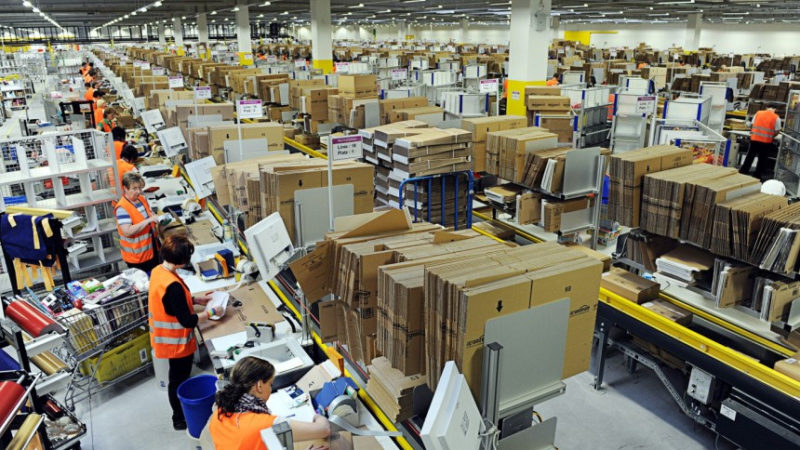How this latest policy wheeze misses the big picture.

The revival of our town centres is a key issue for recover after this pandemic. Not everything can be easily bought or sold online – and many people still want a hands-on shopping experience. Nevertheless, the coronavirus pandemic has accelerated the use of online shopping and its brick-and-mortar cousins are not happy.
Businesses pay over £31bn a year in business rates which is based upon the value of the real estate. A big chunk of this is paid by businesses operating from town centres. In contrast, online business use out-of-town warehouses which have a low real estate value and therefore pay lower business rates. Just seven shops in London’s West End pay more than Amazon’s entire UK operation.
Town centre shops complain that this gives online businesses an unfair competitive advantage, leading to closure of shops and decimation of town centres. A report from the House of Commons Treasury Committee echoed their concerns and said that the business rates system was “broken”.
The government has issued a consultation paper on the review of business rates. One of the options is to levy an online sales tax, possibly at 2% of the turnover, on internet shopping. This could raise £2bn additional revenue and can be used to cut business rates, though the ultimate aim may be scrap business rates altogether and replace with a sales tax. However, all is not what it seems.
To prevent accusations of inflicting additional administrative burdens on small businesses, the government may specify a threshold for levying the online sales tax. This will trigger the creation of complex corporate structures to enable some to dodge the tax.
Business rates are levied upon the entire business and not on specific transactions. As an online sales tax is to be levied on specific transactions, many a business will be tempted to treat it as another form of value added tax (VAT) and pass it on to the consumers in the form of higher prices and further depress household budgets.
It is hard to know what kind of businesses the government is targeting. There are very few online-only businesses. Amazon and eBay provide platforms for small businesses. They may well be forced to either absorb the online sales tax or pass it on to consumers, and this may have unforeseen consequences.
Many high street shops, such as butchers, bakers, newsagents, hairdressers, and charities do not have online sales and primarily trade through brick-and-mortar outlets. So the government cannot yet consider abandoning conventional business rates altogether.
Businesses such as Tesco, Debenhams, Marks & Spencer and many others have presence both in the high street and online. The government proposals will mean that such businesses will end-up paying the conventional business rates and an online sales tax, possibly leading to higher bills.
The additional £2bn revenue is likely to end-up in the coffers of the central government, whilst local councils will remain responsible for providing public services for the areas where online businesses are located. The government’s consultation paper says little about how the £2bn is to be shared by local councils.
As with so many other economic policies, this government initiative is inadequate. The revival of town centres cannot be secured by taxing internet shopping alone. There is a need to control escalating bills for rent and utilities.
Town centres need remodelling, and a strategy for their rejuvenation. This requires a new mix of offices, shops, residential accommodation, leisure and arts facilities, green spaces and affordable public transport.
At the very least, the government should resource local authorities to compulsory purchase, if they so wish, empty shopping malls, shops and offices and remodel them to meet local needs. The government can provide finance for this or can empower local councils to raise funds by issuing bonds direct to the public.
This way, local councils can break the stranglehold of property companies on town centres, and offer rents which take account of local circumstances. A graded system of rents would be helpful.
For example, the minimum rent for a shop could be fixed at £1,000 a month and the upper limit may be £1,500 per month. The charging of the differential (e.g. £500) can be linked to the economic performance of the business.
The formula may be that the retailer would pay a minimum monthly rent of £1,000. If the monthly sales exceed say £20,000 (or any other specified amount) then a graded rent increase would come into play. For example, the sales above £20,000 could require an additional rent of 1% (or any other agreed fraction) with a total maximum of £500. A variety of rent triggering points can be specified.
This kind of an approach can give businesses some relief from escalating rents. The government needs to follow-this up by bringing utilities into public ownership and eliminating profiteering that damages all town centres. Can the government look at the bigger picture?
Prem Sikka is Professor of Accounting at University of Sheffield and Emeritus Professor of Accounting at University of Essex. He is a Contributing Editor to LFF and tweets here.
Left Foot Forward doesn't have the backing of big business or billionaires. We rely on the kind and generous support of ordinary people like you.
You can support hard-hitting journalism that holds the right to account, provides a forum for debate among progressives, and covers the stories the rest of the media ignore. Donate today.



